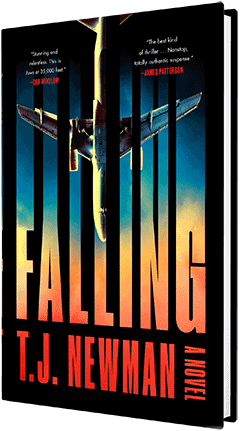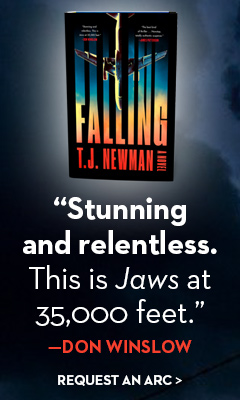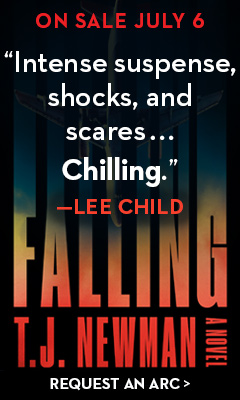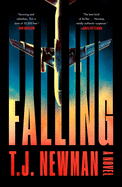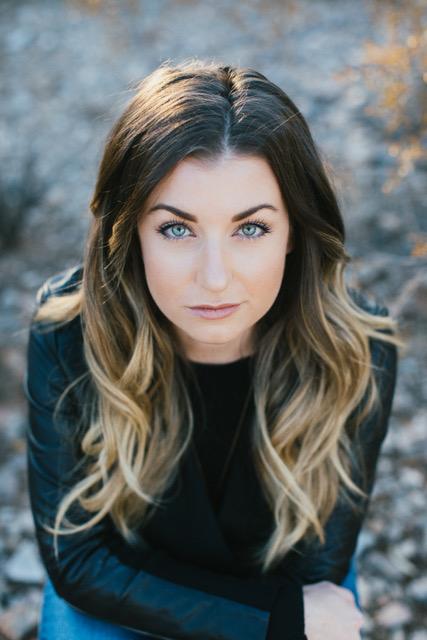Falling
by T.J. Newman
In the propulsive thriller Falling, former flight attendant T.J. Newman imagines her crew's worst nightmare. The result is a Mission Impossible-worthy roller coaster, a quick read begging for screen adaptation.
The debut novelist, who only quit flying as of 2019, opens with quintessential family man Bill Hoffman, a Coastal Airways pilot who's missing his son's Little League game to steer a transcontinental flight as a favor for his boss. As he prepares to leave town, his wife, Carrie, isn't happy with him, but, alas, he's too focused on the task at hand to give her more than a guilty excuse. In a rather dramatic karmic response, as Bill launches his plane into the sky, he quickly learns his family has been taken hostage by the Internet repairman he passed without a thought earlier that morning.
The repairman-turned-terrorist sends Bill a picture of his family, bound and strapped with explosive devices. Through a live video stream, he presents the pilot with a choice: crash your plane when and where I instruct or watch your family die before your eyes. Bill refuses to make such a choice and hatches a plot to rescue both his loved ones and the souls on board his vessel. For that, he'll need to rely on his flight attendants: enigmatic Big Daddy, hapless but eager Kellie and dependable veteran Jo. Turns out, Bill's in luck--Jo has a nephew in the FBI, and all it takes is one quick text to him for the FBI to launch into full emergency-response mode. Soon enough, the White House is evacuated, the president's in his bunker, and a full-on search for the terrorist leaves Bill with hope that his family would be safe. As for the plane itself, he's got Jo and her team to ensure whatever attacks might come from within the cabin are anticipated and blocked.
The terrorist is apparently desperate for revenge, gunning to wreak havoc on a country that devastated his own. He reveals he's Kurdish, and he lost his family when American allies turned their backs on his people in the war against ISIS. Furious at the cushy American lifestyle, as well as how little its citizens seem to care about the plight of his people, he aims to demand their attention--and their respect--through a plane crash. He also has an ally on the plane, but who?
It's difficult to ignore the haze of 9/11 that hangs over this novel. Newman, to her credit, makes the terrorist an empathetic character, a man who's furious at how the U.S. has repeatedly made promises and then reneged, resulting in thousands of innocent Kurds killed. By the end of Falling, Bill finally seems to grasp the heedless violence from American apathy, and his conflict with the terrorist feels more nuanced than many we've seen depicted since the attack on the World Trade Center.
Falling works well within an insulated setting, mimicking the cramped, gasping feel of an airplane bumping through turbulence. Readers will have a hard time not clenching the pages as FBI agent Theo rushes through traffic to locate Bill's family. Every scene feels like it moves faster and faster; every choice Bill makes feels on the precipice of death. And Newman draws on her airline know-how to build a realistic portrayal of an in-flight emergency response. The members of the flight crew move through protocols, call on their training and protect the cockpit at all costs. No deus ex machina appears to save them; they're on their own in the air.
The book is flush with Newman's own pride for American flight crews, describing their duty and commitment with heartfelt sincerity. Despite their fears or their sardonic swipes at one another, Big Daddy, Kellie, Jo and Bill are heroes, devoted to ensuring zero casualties, and from the beginning readers know they will be--must be--victorious. Newman never gives readers any doubt that these characters have their passengers' best interests at heart, a comfort for those who might experience a Falling-induced fear of flying.
Plane thrillers are not a new genre--in fact, they're an established and successful one, especially in film, which is why it's no surprise the adaptation rights for Falling were snapped up in a heated bidding war earlier this year. Directors and casting agents will find plenty to expand upon with Bill and Carrie's tender love story, as well as Jo's deeply trusting relationship with Theo. As in many thrillers, there are a few logical leaps (why have the terrorists targeted Bill specifically?) but the action itself is satisfying, the plot builds at a steady enough clip to keep the pages flipping. The prose is tight--sparse enough not to lose the reader's focus, but still immersive. Through her many nights spent writing this book on red-eye flights, Newman has devised a visceral action-adventure that will leave those reading with bated breath. --Lauren Puckett



